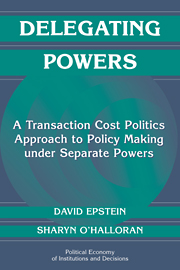Book contents
- Frontmatter
- Contents
- List of Figures and Tables
- Preface
- 1 PATHS OF POLICY MAKING
- 2 CHOOSING HOW TO DECIDE
- 3 TRANSACTION COST POLITICS
- 4 THE DECISION TO DELEGATE
- 5 DATA AND POSTWAR TRENDS
- 6 DELEGATION AND CONGRESSIONAL-EXECUTIVE RELATIONS
- 7 DELEGATION AND LEGISLATIVE ORGANIZATION
- 8 DELEGATION AND ISSUE AREAS
- 9 CONCLUSION
- AN AFTERWORD ON COMPARATIVE INSTITUTIONS
- APPENDICES
- References
- Index
- Titles in the series
2 - CHOOSING HOW TO DECIDE
Published online by Cambridge University Press: 02 December 2009
- Frontmatter
- Contents
- List of Figures and Tables
- Preface
- 1 PATHS OF POLICY MAKING
- 2 CHOOSING HOW TO DECIDE
- 3 TRANSACTION COST POLITICS
- 4 THE DECISION TO DELEGATE
- 5 DATA AND POSTWAR TRENDS
- 6 DELEGATION AND CONGRESSIONAL-EXECUTIVE RELATIONS
- 7 DELEGATION AND LEGISLATIVE ORGANIZATION
- 8 DELEGATION AND ISSUE AREAS
- 9 CONCLUSION
- AN AFTERWORD ON COMPARATIVE INSTITUTIONS
- APPENDICES
- References
- Index
- Titles in the series
Summary
It is only against a background of hard reality that choices count.
Ben Shahn, The Shape of ContentOur approach to congressional delegation states that legislators cede substantive discretionary authority to the bureaucracy in policy areas where the legislative process is least efficient relative to bureaucratic decision making. In this chapter, we provide background for our argument by reviewing recent work on both congressional policy making and legislative oversight of the bureaucracy. We then discuss previous treatments of the question of when Congress delegates and conclude by arguing that to understand delegation one must measure it against the hard reality of making policy through congressional committees.
LEGISLATIVE ORGANIZATION
The starting point of modern congressional analysis is David Mayhew's book The Electoral Connection (1974), which lays out a vision of congressional organization as a rationally constructed, conscious choice made by reelection-seeking individuals. Mayhew emphasized the importance of the committee system as a basis for members to pursue their electoral goals and consequently downplayed the role of parties. His study has remained influential mainly due to its methodological focus: It took a ground-up view of legislative organization and built upon this edifice a theory of public policy. Mayhew's incentive-based approach and deductive style of argumentation are typical of economic analysis, even if no explicit formal models, economic or otherwise, were employed.
Social Choice Roots
The second strand of modern theories of Congress has its roots in social-choice theory, a rather abstract branch of study somewhere in the intersection of mathematical economics and decision theory.
- Type
- Chapter
- Information
- Delegating PowersA Transaction Cost Politics Approach to Policy Making under Separate Powers, pp. 14 - 33Publisher: Cambridge University PressPrint publication year: 1999



